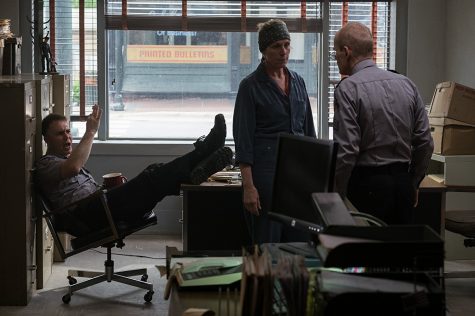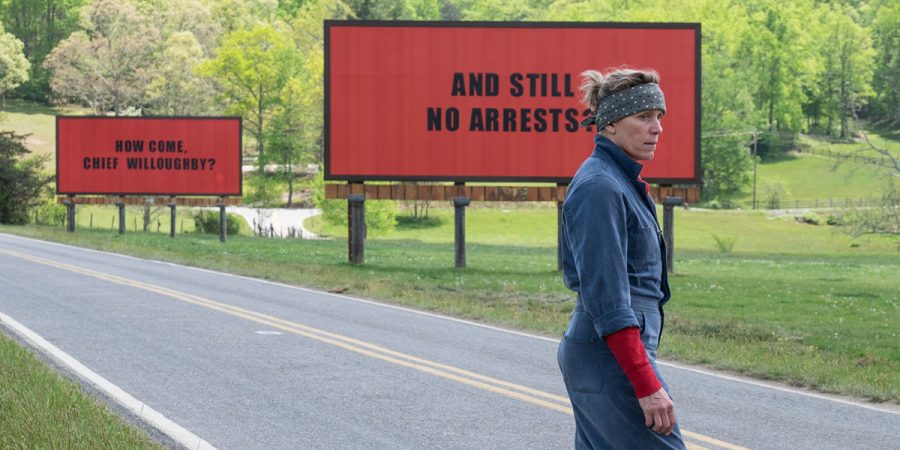“Three Billboards” boasts poor writing and characterization
The recently released comedy-drama “Three Billboards Outside Ebbing, Missouri” has been a favorite during awards season. WSS offers a different opinion.
January 22, 2018
The power of anger in the movies is well known to any film-lover. Movies have become infamous as platforms to exorcise such feelings, to imprint them upon the screen and eventually the viewer. Some of the finest films I have seen are about festering anger building up: “Taxi Driver,” “Who’s Afraid of Virginia Woolf,” “Do the Right Thing” and “The Wild Bunch” to name a few renowned examples. These are films that are able to harness these feelings of extreme frustration and garner a fierce energy that carries the film. “Three Billboards Outside Ebbing, Missouri” attempts to utilize this same energy, but becomes muddled along the way.
When the film opens, Mildred, portrayed by Frances McDormand, decides that she’s had enough of the ineptitude of the local police. For a year they have been unable to make any progress in the search for her daughter’s killer. So, she decides to rent three billboards outside the town in an attempt to reignite their attention in the case.
The film attempts to do justice to all of its characters in order to counteract the central theme of injustice and unfairness in the world. McDonough’s script is not able to pull this off as seamlessly as he hopes. The script claims forgiveness, but has some trouble actually getting around the definition of it. For example, characters will apologize, and that will be it. As the viewer, you feel like a parent telling a kid that they aren’t really sorry, they just want to get out of trouble.
Frances McDormand has been lauded by critics for giving her best performance since “Fargo.” This isn’t true for a couple reasons. McDormand is one of the most talented actresses of our time, and she does justice to the script. The problem is that the script doesn’t do justice to her character. The character (and the performance as well) is very one note. Mildred spends just about the whole film being angry about her daughter’s death, almost to the point of being psychotic. While the police system in this film is riddled with countless problems, slacking off in the murder case is not one of them. They state over and over that they have done everything they can to find a lead in the case, but it just isn’t possible. There was no evidence. So we have to gather then that perhaps it is some internalized rage at herself for how she treated her daughter. There is one flashback scene, but it doesn’t develop the relationship enough to give us suitable answers to these questions.
And, for the record, McDormand’s finest performance since “Fargo” was actually her role in “Moonrise Kingdom” a couple years back as Mrs. Bishop.

What of the cops in the movie themselves? This is another problem with the film. It tries to approach police brutality and prejudice with a mannered lens, but fails in execution. Racism in the film just serves as yet another device to make the audience uncomfortable. One character in particular is problematic, and that is Dixon played by Sam Rockwell. The character is all over the place. He is simultaneously a buffoonish clown and a monster capable of torturing suspects, but underneath all of this he’s really just looking to do the right thing. He even ends up redeeming himself, but only in certain capacities. He’s on the white woman’s side now, but the movie chooses to forget the fact that throughout the run time he has been accused of beating black suspects nearly to death. Though this seems like it would be the more important issue, it is just glossed over by the film. Once more, it’s only brought up to make sure you don’t feel an ounce of comfort from the picture.
The biggest problem with Dixon is that the character becomes lost in the many twists and turns that McDonough throws at him during the run time. This seems like something that’s a interesting idea in theory, but with everything else that’s happening in the movie, a change will just soar out of nowhere and becomes unbelievable.
“Three Billboards Outside Ebbing, Missouri” is a very ambitious film, and one that I went into with an open mind. The trailers are deceptive, advertising it as a darkly comedic neo-noir, when in actuality it’s a terribly bleak southern Gothic with a couple awkwardly placed jokes peppered in. It’s a pretty bad movie, but there are a couple things that save it from being a complete mess. It’s got good actors, though they are somewhat wasted and a decent score by Carter Burwell. Ben Davis lends the film a certain stylish flair with his cinematography. It’s a bit all over the place, like the rest of the production but in this case that isn’t a problem. In the end, none of this can save the film from its awful screenplay and characterization.





